#madame victurnien
Text

#my posts#les mis#les miserables#victor hugo#lascelles wraxall#wraxall translation#lynd ward#lm 1.5.8#madame victurnien
14 notes
·
View notes
Text
Of course, Fantine’s happy ending last chapter didn’t last. There’s this recurring idea of people randomly disliking her, whether out of envy (for her hair and teeth) or her demeanor (as we saw with the grisettes earlier). I think it’s interesting that here, Hugo shifts from mutual misunderstanding (the grisettes thought Fantine was putting on airs, and Fantine was just very oblivious) to hypocrisy. Fantine continues to be a bit oblivious, but there isn’t as much emphasis on what she does (or does not) do or notice as there is on other people’s obsession with her. This is especially noticeable with Madame Victurnien:
“In her youth, in ’93, she [Madame Victurnien] had married a monk who had fled from his cloister in a red cap, and passed from the Bernardines to the Jacobins. She was dry, rough, peevish, sharp, captious, almost venomous; all this in memory of her monk, whose widow she was, and who had ruled over her masterfully and bent her to his will. She was a nettle in which the rustle of the cassock was visible. At the Restoration she had turned bigot, and that with so much energy that the priests had forgiven her her monk. She had a small property, which she bequeathed with much ostentation to a religious community.”
The political flip-flopping of both her and her former husband already suggests some hypocrisy, as they changed from supporting the religious establishment to the Revolution and then back again based on what was convenient for their interests (like their ability to marry). Even within their beliefs, there are some evident contradictions. Her “Jacobin” husband, for instance, “ruled over her masterfully;” while French revolutionaries were not inherently supportive of women’s rights, that Hugo would choose this language to describe someone who ostensibly supported rights like liberty is telling. Similarly, Mme Victurnien has likely committed one of the gravest offences against religion in the town - marrying a monk - but compensates for that by policing everyone else’s morality.
Oddly enough, I don’t think the description of her is without sympathy, although Hugo definitely doesn’t want us to view her positively. Yes, she’s hypocritical and cruel, but she’s also responding to her circumstances. She’s “a nettle,” and like Madeleine said a few chapters ago, nettles can be great if properly cared for. However, since Mme Victurnien is in this environment where any perceived slight against religious morality can have grave consequences, she feels that the best way to protect herself is to perform piety by giving to the Church and demanding adherence to these mores from others.
39 notes
·
View notes
Text
Les Misérables - Madame Victurnien Spends Thirty Francs on Morality
One thing about this chapter that I hadn’t noticed before hit me really hard on the reread.
And there was one old gossip who went to Montfermeil, talked with the Thénardiers, and said on her return: “For my thirty-five francs, I have found out all about it. I have seen the child!”
We know that this gets Fantine fired and leads to all her misery that follows, and that is horrible enough. But on top of that: “I have seen the child!” What has she seen? Thisis the description of Cosette at the Thénardiers’ from an earlier chapter:
Her clothes being gone, they dressed her in the cast-off garments of the little Thénardiers, that is in rags. They fed her on the orts and ends, a little better than the dog, and a little worse than the cat. The dog and cat were her messmates. Cosette ate with them under the table and in a wooden dish like theirs.
…Cosette was made to run errands, sweep the rooms, the yard, the street, wash the dishes, and even carry burdens…It was a harrowing sight to see in the winter time the poor child, not yet six years old, shivering under the tatters of what was once a calico dress, sweeping the streetbefore daylight with an enormous broom in her little red hands and tears in her dark eyes.
This, more or less, is what Madame Victurnien saw. She did not saw anything about this. She did not do anything about this. She did not care anything about this. The ‘scandal’ for her was that Fantine had a child, not that the child was being horrifically abused and neglected. She knew that Fantine cared about her child - the cause of her ‘investigation’ in the first place came from the fact that Fantine wrote to the Thénardiers regularly. But Madame Victurnian’s ‘morality’ doesn’t include one particle of consideration for the idea that something should be done to help an abused child.
That may be the worst irony of all. Someone going to Montfermeil to ‘investigate’ could have been a boon - could have brought the crucial information that all the money Fantine was sending was doing nothing at all to benefit her child. The outrage that focused on Fantine being an unmarried mother coild instead have focused on the fact that Cosette was being mistreated, and on getting her away from the Thénardiers and to her mother, and enabling both of them to live decently. But Madame Victurnien didn’t care enough to even mention it, and people who would have cared - Fantine about her daughter, and Madeleine about both Fantine and her daughter, if he had known - were never told.
36 notes
·
View notes
Text
203 notes
·
View notes
Text
An age-old question: What is wrong with Hapgood’s numbers? Why does her translation state 30 francs when it's unmistakably 35 in the original text?
"So Fantine was watched." Much like everyone else in the town, I presume. Moral scrutiny is a prevalent concern in Montreuil-sur-mer.
It was a joy to witness Fantine at peace and almost happy, if only for a short time (just a year).
Hugo exhibits his typical disdain for elderly women, as seen here: “Madame Victurnien was fifty-six, and re-enforced the mask of ugliness with the mask of age. […] She was dry, rough, peevish, sharp, captious, almost venomous.” Of course, this formidable character would spare no expense to ruin a younger woman's life. (To be clear, this is a sarcastic remark.) On the other hand, by providing her backstory about her abusive former-monk husband, Hugo somewhat explains why she is the way she is.
Fantine's life is shattered, and she is too timid and predisposed to accept non-existent guilt, refusing to stand up for herself. “She was advised to see the mayor; she did not dare.” A BIG mistake! It's disheartening that Jean Valjean becomes an unwitting accomplice to this tragedy due to his "high moral code," which, among other things, encourages people to spy on their neighbours and co-workers.
35 notes
·
View notes
Photo



LES MIS LETTERS IN ADAPTATION - Madame Victurnien's Success, LM 1.5.9 (Shoujo Cosette)
The old woman who had given her lessons in what may be called the life of indigence, was a sainted spinster named Marguerite, who was pious with a true piety, poor and charitable towards the poor, and even towards the rich, knowing how to write just sufficiently to sign herself Marguerite, and believing in God, which is science.
#Les Mis#Les Miserables#Les Mis Letters#Les Mis Letters in Adaptation#Shoujo Cosette#lesmisedit#animeedit#lesmiserablesedit#Fantine#Marguerite#pureanonedits#Shoujocosetteedit#LM 1.5.9
131 notes
·
View notes
Text
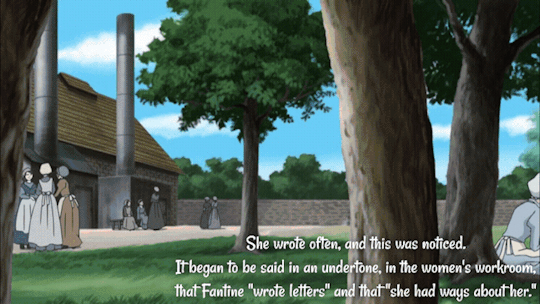
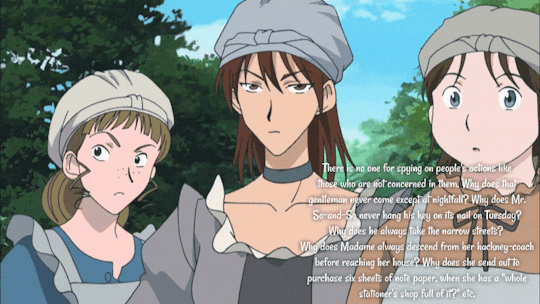
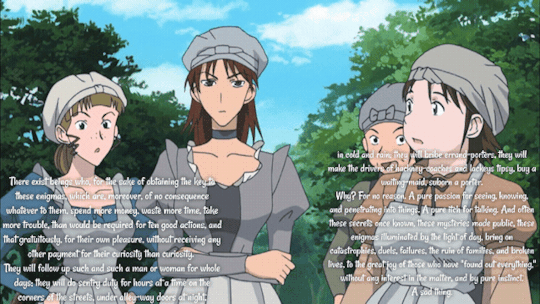
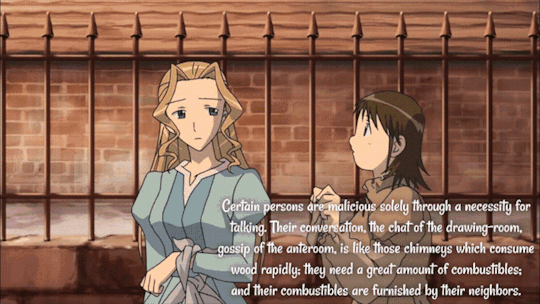
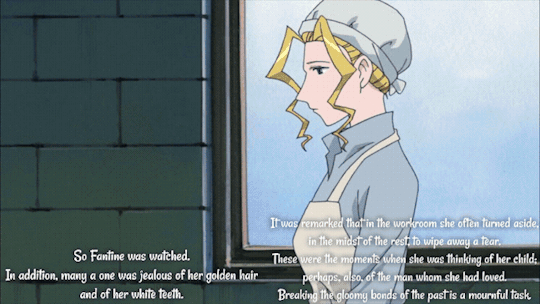


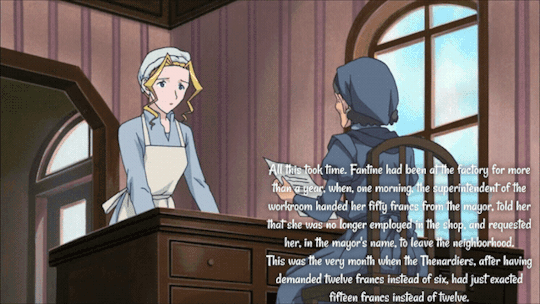
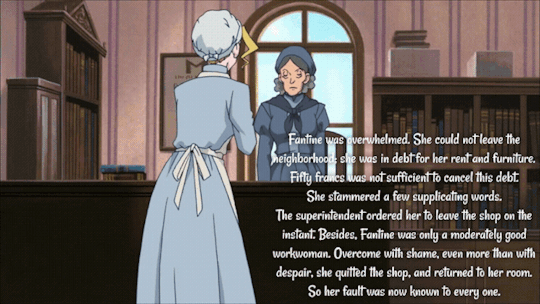
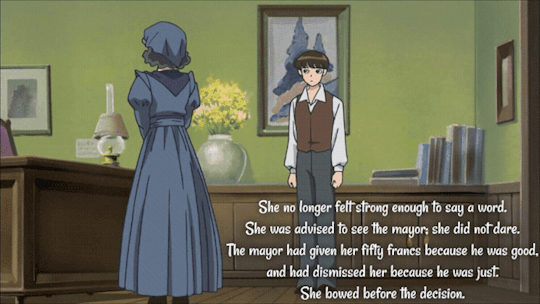
Madame Victurnien expends Thirty Five Francs on Morality. Volume 1, Book 5, Chapter 8.
Clips from <Il cuore di Cosette>.
#Les miserables#les mis#My Post#Fantine#Poor Mother...#Mme. Victurnien#Jean Valjean#M. Madeleine#At the End of the Day#Well. Jealousy and Fake Morality kills a person like this.#Is that all you wanted Victurnien?#You made factory have more 'honest' people#But you made another wh*** on the street!#What's the difference?!#Oh. PLEASE!!#DON'T CARE ABOUT OTHERS AROUND YOU!#Just Take Care of YOURSELF!!#Ah. By the way though in ICDC Victurnien looks like around Fantine's age or a little older and makes this was more related to her jealousy.#Also. Did I mentioned about Valjean's old idea of Men and Women(Like most of the humans had at 19th century.)?#It looks like he's going to pay the price of that in a few chapters later.#THE VERY EXPENSIVE PRICE.#The Brick#Il cuore di Cosette#Les Mis Letters
17 notes
·
View notes
Text
Chapter 1.5.8 of Les Mis brings us back to Fantine, and a few moments of relative brightness in her life — which don't even last until the end of the chapter. How different the rest of this would be if she'd gone and seen the mayor — but of course, she doesn't. Why would she? "[T]he overseer of the workshop handed her, on behalf of the mayor, fifty francs, saying that she was no longer wanted in the shop, and enjoining her, on behalf of the mayor, to leave the city."
She thinks the mayor is why she's been fired.
Arai covers this chapter from pages 401–414 (when it was originally published, this marked the beginning of the month's installment of the manga, entitled "The Descent"). There is no named Madame Victurnien, though there is a nosy, judgemental coworker who bribes the letter-writer into letting her know what's in the letters Fantine has been sending and receiving.
And then, the supervisor dismisses Fantine.

39 notes
·
View notes
Text
Headcanon that madame victurnien's dead monk husband was the monk mentioned in dolls of new albion
2 notes
·
View notes
Text
In honor of finally catching up on six chapters of Les Mis, have a bunch of quotes about light and shadow (blorbo from my literary motifs)
"Below living on a little lies the art of living on nothing. They are two rooms' the first is dim, the second totally dark." (1.5.9)
"From her window Madame Victurnien sometimes saw her going by, noticed the distress of 'that creature,' [Fantine] 'thanks to me putting her in her place,' and congratulated herself. The malicious have a dark happiness. (1.5.9)
"The lower [Fantine] sank, the darker everything became around her, the more the sweet little angel [Cosette] shone out in her innermost heart." (1.5.10)
"He who knows that sees all darkness.
"He is alone. His name is God" (1.5.11) [I really love this quote as God is usually associated with light and goodness in the world, not the evil of it]
"She talked this way, bent double, shaken with sobs, blinded by tears, her chest bare, wringing her hands, coughing a dry, short cough, stammering quietly with agony in her voice. Great grief is a divine and terrible radiance that transfigures the wretched. At that instant Fantine had again become beautiful." (1.5.13)
"Meanwhile [Fantine] also was in the grips of a strange turnmoil [...] Before her eyes she had seen a struggle between two men who held in their hands her liberty, her life, her soul, her child; one of these men was drawing her to the side of darkness, the other was leading her toward the light." (1.5.13) [Paralleling Valjean's own struggle earlier with the complete collapse of his previous beliefs]
"From that moment M Madeleine [while praying] was transfigured in the eyes of Fantine; to her he seemed bathed in light." (1.6.1) [In parallel to when Valjean comes upon M Myriel while sleeping and he too radiates light]
You'll take this motif out of my cold, dead hands. Also good way to pack in a bunch of stuff since I don't want to flood the tags - though there's a few other things I want to go back to and point out. Especially about Javert since today's chapter basically was about him.
11 notes
·
View notes
Text
Today's chapter ("Madam Victurnien Expends Thirty Francs on Morality") is very much in the category of "Victor Hugo breaks into my house and starts ranting at me on a topic that I very much did not ask him about".
Not that I disagree with him (Victor Hugo said Purity Culture Does Far More Harm Than Good), but you really have to read this one as rantily as possible in order to be able to follow it.
8 notes
·
View notes
Text
“Fantine or the Fate of a Grizette”
I already thought this New York Clipper article, which describes a 1863 adaptation of Les Misérables at Grover’s Theatre, was cool because I love the list of principal characters. (Blancheville gets to sing a song? Marguerite is included!) But then I got to the last part, where they mention that it has music by Charles Koppitz! And realized that this is the production which David Bellos discussed at BarricadesCon! (Actually the title of the play could have tipped me off to that but it didn’t). The score can be found here.
An interesting little piece of history. But by no means unique. Well, this production might have been uniquely good by the sounds of it, but there were quite a few adaptations of Les Misérables being put on around the United States in 1862 and 1863. The earliest I have found (so far) was October 1862, in Marysville California with J. B. Booth Jr. (brother of John Wilkes Booth) as one of the principal actors (I wish I had more to say on that but so far I just have a one sentence mention of it in one newspaper). And you’ll notice that in this article, they say “still another” play “has come to light since our last.” That’s because this article is from January 31st 1863, but on January 17th they had reported a different production of Les Miserables entirely that was also being put on. And the next month there would be at least two other productions put on in the area, reported on by the same paper (one of which was notably long, only ending at one in the morning and later being cut down so that it ended at 11).
(This article was in that super dense no paragraph break style of newspapers of the time so I have broken it up considerably for readability).
And still another dramatization of “Les Miserables” has come to light since our last. This last is the production of Mr. Albert Cassedy, of Washington, D.C., and was presented for the first time at Grover’s Theatre, on the 19th inst., continuing through the week.
Mr. Cassedy calls his work “Fantine, or the Fate of a Grizette.” The cast embraces the entire company, and as our friends may like to see the distribution of characters, we give it, as follows: —
Fantine, Kate Denin
Jean Valjean, Father Madelaine, M. Madeleine, Mayor, Charles Barron
Bishop of Myriel, Ben Rogers
Javert, M. H. Bokee
Tholomyes, D. Setchell
Blackeville [sic] (with a song), J. L. Barrett
Scaufflaire, Harry Clifford
Fauchelevent, H. McDolanld
Little Gervais (with a song), Sophie Gimber
Prosecuting Attorney, Alonzo Read
Host of the Inn, M.A. Kennedy
Champmathieu, T. M. Wemyss
Brevet, J. V. Daily
Listolier, E. S. Tarr
Favorite (with a song), Viola Crocker
Madame Magloire, Mrs G. O. Germon
Sister Simplice, Isabella Freeman
Baptistine, Addie Anderson
Marguerite, Fanny Ryan
Dahlia, Ada Monk
Zephine, Flora Lee
Cosette, Little Katy
Madame Victurnien, Minnie Monk
Madame Thenardier, Jennie Monk
Extra pains were taken to give due effect to this great work, and the full resources of the establishment were called in, to place the play in a proper manner before the public. New music was arranged by Koppitz, the “Nightingale;” and fresh scenery and skilful effects introduced. The last scene is said to be a gem; it is an allegorical tableau, representing the finding of Cosette by Jean Valjean, and the Apotheosis of Fantine.
Here is a review from the Washington DC Evening Star, 20 January 1863
Mr. Cassedy’s dramatization from “Fantine,” drew an immense house last night. The author has certainly been very happy in his adaptation, and having a company from which to cast his characters, whereon he could depend, the success of the piece was hardly to be wondered at. Mr. Cassedy has in a very felicitous manner woven into the representation every prominent feature in the book, and he has performed the difficult task of giving a somewhat prominent part to each of some thirty performers. If Mr. Barron could be induced to dispense with some of his spasmodic actions and fifth-rate melodramatic rant in the part of Jean Valjean, it would be all the better for the play. “Fantine” will be performed again tonight.
#les miserables#other stage adaptations#Cassedy's adaptation#my research#barricadescon#lm in america#sorry if this is dense#i'm just not terribly good at summarizing things#and I have a whole lot of other posts about this era queued but I have a terribly long and disorganized queue#so it might take a while for them to work their way out#but I am pushing this one to the top
7 notes
·
View notes
Text
Hugo’s choice to describe both the woman who fires Fantine and the woman who teaches her how to live in poverty as “spinsters” indicates that there are parallels between them. The former is “full of the charity which consists in giving, but not having in the same degree that charity which consists in understanding and in forgiving”, while the latter, Marguerite, is “pious with a true piety, poor and charitable towards the poor, and even towards the rich.” I think what we’re once again seeing is the debate over the place/value of charity. The woman who fired Fantine is praised for her charity - that is likely what convinced Madeleine to hire her - but as her charity is limited by her idea of who is “deserving,” it can never truly have that great of an impact. In contrast, Marguerite is willing to help everyone. As we know from the latter half of this chapter, Fantine is scorned by the rest of the townspeople, so interacting with her could be risky. Marguerite, however, cares more that there’s someone in need, making her charity more impactful. At the same time, Marguerite is poor herself. While this may be exactly what gives her solidarity with Fantine, it seriously limits her ability to change her situation. It’s true that without her, Fantine wouldn’t have been able to survive after losing her job. But it’s also true that Fantine’s health is constantly deteriorating (her cough is getting worse) and that, even with all of the time she spends working, her payments to the Thénardiers have become irregular. Charity is wonderful, but only social change and a real support system could help Fantine.
This is less direcly related, but I’m fascinated by the number of women in this book who don’t have husbands, given the expectation for women to marry. Some of them, like Mme Victurnien, are widows, but many of them (Baptistine, the two “spinsters” in this chapter) simply never married. To some extent, it’s possible this is simply a realistic representation of France at the time. After years of war, it wouldn’t be surprising if many women lost their husbands either during the Revolution, one of the wars relating to it, or during Napoleon’s campaigns, for instance. These women would also be more directly vulnerable to poverty. We don’t know how much Fantine was paid while she worked at the factory, but afterward, she makes 12 sous a day, which is less than what Valjean made working on his way to Digne (and that’s even after he was paid half as much because he was a convict). Consequently, they’re less likely to be able to support themselves, as their salaries are very low and, if they don’t have a male relative to provide for them in the way that Baptistine does (and that Valjean’s sister did, although poverty still caught up to her), it’s very hard to live off of what they earn alone. Additionally, these women would be more likely to work for that same reason: they need the money if they don’t have a husband who can work. And on top of that, their behavior in relation to men is constantly scrutinized. Even their titles - Madame, Mademoiselle - automatically indicate to us if they have ever been married. Hugo himself pointed out the difference in status accorded to women based on marriage and motherhood while describing Baptistine, and that’s certainly at play here (although without one, the other isn’t given value; otherwise, Fantine would be much more respected as a mother). As an unmarried woman who hasn’t been in town long enough to establish “respectability” in the same way that, say, the woman running the factory, has, Fantine’s behavior in relation to men remains what is used to condemn her (the idea that she had a relationship with a man that left her with a child outside of marriage). For once, this horrible treatment of women is actually not on Hugo, but it’s very frustrating to read about.
64 notes
·
View notes
Text
I'm now ahead on Les Mis Letters, having decided to read all of Part One in one gulp based on what @fremedon says in this post (thematic/tone description of the rest of the book, no plot spoilers).
A few comments on 1.5 through today's email, not recapping or comprehensive, just things I noted:
Chapter 1.5.4, "Monsieur Madeleine in Mourning": I cannot begin to say how upsetting I found the long paragraph about the beauty of "being blind and being loved" (by a woman, specifically):
to know you are the center of every step she takes, of every word, of every song, to manifest your own gravitational pull every minute of the day, to feel yourself all the more powerful for your infirmity, to become in darkness, and through darkness, the star around which this angel revolves—few forms of bliss come anywhere near it!
Gah!!!!!
Chapter 1.5.5, "Dim Flashes of Lightning on the Horizon":
What a heck of a character introduction:
The Asturian peasants are convinced that in every litter of wolves there is one pup who is killed by the mother because otherwise it would grow up to devour all the other pups.
Give that male wolf puppy a human face, and you’d have Javert.
(I strongly disapprove of Hugo's conflation of beauty with virtue, so this is not about the appearance but the analogy.)
Chapter 1.5.9, "Madame Victurnien's Success": Well. There's the interiority I was wondering if we'd get for Fantine. Shame it isn't under better circumstances.
Chapter 1.5.10, "Continued Success": Hugo loves irony with these chapter titles, huh? It really works.
Rose's translation of the last line here echoes the last line of book three. Compare:
... she had given herself to this Tholomyès as to a husband, and the poor girl had a child.
With:
The poor girl made herself a whore.
It's very effective.
#les mis letters#les miserables#julie rose translation#lm 1.5.4#lm 1.5.5#lm 1.5.9#lm 1.5.10#mine-ish
5 notes
·
View notes
Note
“Do you trust me?” / from valjean!
@peoplesing || thank you!
She did not immediately answer. Whether it was Madame Victurnien's actions or not, she had acted on behalf of Madeleine's morals and Fantine had suffered for it. Fantine was wise not to tell a soul anything, no matter how miniscular, about her. Madeleine seemed to understand that too, now answering to the name Valjean and uncovering his own secrets with it.
It was not often she became (let alone) remained angry. Yet he moved and evaded the law with ease, something Fantine was not afforded despite her innocence against Bamatabois.
He wanted to keep his freedom, she wanted to ensure her child's survival, and yet out of the two of them, Fantine had suffered disproportionately more than this criminal on the run. His morals influencing her dismissal sent rage through her veins, a feat even Tholomyès hadn't achieved; no, with him it was unspeakable grief.
"As long as you protect my child, I shall trust you."
It was easier that way. Trusting was not a luxury she could afford, especially with a man whose identity shifted with the shadows cast upon his face.
Time would tell if her trust was misplaced.
#peoplesing#c; valjean#au; undetermined#popping this in my fantine lives universe bc i can#fantine trying to be polite and simultaneously working through her emotions this man causes her#answered ask#thank you!
1 note
·
View note
Text
Madame Victurnien’s Success
Volume 1: fantine; Book 5: The Descent; Chapter 9: Madame Victurnien’s Success
So the monk’s widow was good for something.
But M. Madeleine had heard nothing of all this. Life is full of just such combinations of events. M. Madeleine was in the habit of almost never entering the women’s workroom.
At the head of this room he had placed an elderly spinster, whom the priest had provided for him, and he had full confidence in this superintendent,—a truly respectable person, firm, equitable, upright, full of the charity which consists in giving, but not having in the same degree that charity which consists in understanding and in forgiving. M. Madeleine relied wholly on her. The best men are often obliged to delegate their authority. It was with this full power, and the conviction that she was doing right, that the superintendent had instituted the suit, judged, condemned, and executed Fantine.
As regards the fifty francs, she had given them from a fund which M. Madeleine had intrusted to her for charitable purposes, and for giving assistance to the workwomen, and of which she rendered no account.
Fantine tried to obtain a situation as a servant in the neighborhood; she went from house to house. No one would have her. She could not leave town. The second-hand dealer, to whom she was in debt for her furniture—and what furniture!—said to her, “If you leave, I will have you arrested as a thief.” The householder, whom she owed for her rent, said to her, “You are young and pretty; you can pay.�� She divided the fifty francs between the landlord and the furniture-dealer, returned to the latter three-quarters of his goods, kept only necessaries, and found herself without work, without a trade, with nothing but her bed, and still about fifty francs in debt.
She began to make coarse shirts for soldiers of the garrison, and earned twelve sous a day. Her daughter cost her ten. It was at this point that she began to pay the Thénardiers irregularly.
However, the old woman who lighted her candle for her when she returned at night, taught her the art of living in misery. Back of living on little, there is the living on nothing. These are the two chambers; the first is dark, the second is black.
Fantine learned how to live without fire entirely in the winter; how to give up a bird which eats a half a farthing’s worth of millet every two days; how to make a coverlet of one’s petticoat, and a petticoat of one’s coverlet; how to save one’s candle, by taking one’s meals by the light of the opposite window. No one knows all that certain feeble creatures, who have grown old in privation and honesty, can get out of a sou. It ends by being a talent. Fantine acquired this sublime talent, and regained a little courage.
At this epoch she said to a neighbor, “Bah! I say to myself, by only sleeping five hours, and working all the rest of the time at my sewing, I shall always manage to nearly earn my bread. And, then, when one is sad, one eats less. Well, sufferings, uneasiness, a little bread on one hand, trouble on the other,—all this will support me.”
It would have been a great happiness to have her little girl with her in this distress. She thought of having her come. But what then! Make her share her own destitution! And then, she was in debt to the Thénardiers! How could she pay them? And the journey! How pay for that?
The old woman who had given her lessons in what may be called the life of indigence, was a sainted spinster named Marguerite, who was pious with a true piety, poor and charitable towards the poor, and even towards the rich, knowing how to write just sufficiently to sign herself Marguerite, and believing in God, which is science.
There are many such virtuous people in this lower world; some day they will be in the world above. This life has a morrow.
At first, Fantine had been so ashamed that she had not dared to go out.
When she was in the street, she divined that people turned round behind her, and pointed at her; every one stared at her and no one greeted her; the cold and bitter scorn of the passers-by penetrated her very flesh and soul like a north wind.
It seems as though an unfortunate woman were utterly bare beneath the sarcasm and the curiosity of all in small towns. In Paris, at least, no one knows you, and this obscurity is a garment. Oh! how she would have liked to betake herself to Paris! Impossible!
She was obliged to accustom herself to disrepute, as she had accustomed herself to indigence. Gradually she decided on her course. At the expiration of two or three months she shook off her shame, and began to go about as though there were nothing the matter. “It is all the same to me,” she said.
She went and came, bearing her head well up, with a bitter smile, and was conscious that she was becoming brazen-faced.
Madame Victurnien sometimes saw her passing, from her window, noticed the distress of “that creature” who, “thanks to her,” had been “put back in her proper place,” and congratulated herself. The happiness of the evil-minded is black.
Excess of toil wore out Fantine, and the little dry cough which troubled her increased. She sometimes said to her neighbor, Marguerite, “Just feel how hot my hands are!”
Nevertheless, when she combed her beautiful hair in the morning with an old broken comb, and it flowed about her like floss silk, she experienced a moment of happy coquetry.
1 note
·
View note